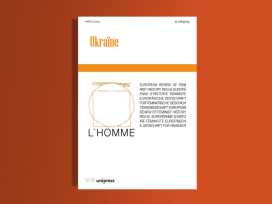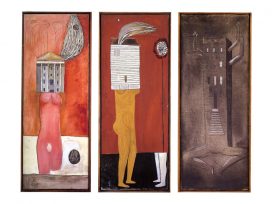Abstracts for L'Homme 1/2004
ANKE BURKHARDT, UTA SCHLEGEL:
East German Women in Higher Education System before and after Reunification
For East German women working formed (and still forms) an important part of their lives. Strong orientation towards employment during the DDR period was not only the result of direction by the state or economic constraints but also met individuals’ needs. Based on an extensive system of whole-day child care the situation was characterised by high activity rate, a relatively low proportion of part-time employment and a high level of qualification. From the beginning of the 1970s the number of female and male students in higher education was the same. A wide range of measures taken in order to promote women reduced discrimination against them but did not eliminate it. The higher educational system was a classic example of a sex-specific qualificational and occupational pyramid. However the majority felt that women and men in the DDR had enjoyed equality. After the Wall came down female scientists looked forward to the future, whose risks they saw as being outweighed by the opportunities. They attached little importance to gender-equality issues. Equal rights were taken for granted. The renewal of East German higher education system was essentially an adaptation to the West German system. This process led to numerous far-reaching and lasting changes concerning especially number of posts, working conditions, structure of scientific staff, system of postgraduate qualification and pattern of an academic career. Male and female academics have been affected in very different ways, although this was not explicitly reflected in policy or recognised as being an important factor when making decisions. There began an exclusion process that often worked to women’s disadvantage. Under the new conditions women find it more difficult to achieve their career objectives in the academic world. They are faced with a revival of gender stereotypes. 10 years after it must be concluded that – from a gender-equality perspective – renewal seems to have done little to alter the traditional male dominance in this field.
KRISTEN GHODSEE:
Red Nostalgia? Communism, Women’s Emancipation, and Economic Transformation in Bulgaria
This brief article aims to explore why many Bulgarian women in the early years of the 21st century are more inclined to support leftist political parties and have a less critical view of the communist past than their male compatriots. By exploring some of the legal and material gains that Bulgarian women made under the socialist system, the article demonstrates that communist governments between 1944 and 1989 were both ideologically and materially committed to women’s equality in ways that fundamentally reshaped gender relations in Bulgaria. Although there was still gender discrimination and occupational segregation under communism – and Bulgarian patriarchal values never disappeared completely – there were real improvements in women’s education and in women’s full incorporation into the public sphere. These gains resulted in some of the highest labour force participation rates for women in the world, and have not been forgotten by the women who make up over half of the Bulgarian polity today.
KATALIN FÁBIÁN:
Bridges across the Public-Private Divide: The Welfare-Related Activism of Hungarian Women after 1989
Hungarian women’s groups grew from one to 40 within one decade. Political change was their common goal. Many groups demanded to participate in public life, often through welfare-related issues. Between 1989 and 2001, retirement and maternity benefits were the main issues that united women’s groups. This essay examines their tactics and successes. The Hungarian case demonstrates that in a post-communist setting it is not the welfare state that excludes women’s organizations, but a paternalistic political culture. Many women’s groups chose welfare as a way to break into politics but changing the political agenda remains a significant challenge.
ANGELIKA EPPLE:
History of Historiography as Discourse Analysis und Analysis of Power: a Newdefinition of History under Conditions of Gender-History
Bringing women back into historiography is an important but not the only issue motivating a new definition of the genre. The history of historiography should be both: a discourse analysis of men’s and women’s historical writings and an analysis of power. This article refutes a classical scientific history and its search for mental development. It follows the ideas of Michel Foucault and his theory of discourse analysis. This leads to the conviction of historicity of all orders of knowledge. The application of Foucault, however, is limited. Foucault analyses a given canon and fails to grasp significant discontinuities: epistemology is deeply gendered. The article reformulates the theory of discourse analysis under the conditions of gender history. It concludes by examining historical narratives of Elisa von der Recke and Friedrich Nicolai.
Published 9 November 2004
Original in English
Contributed by L'Homme © L'Homme Eurozine
PDF/PRINTNewsletter
Subscribe to know what’s worth thinking about.



